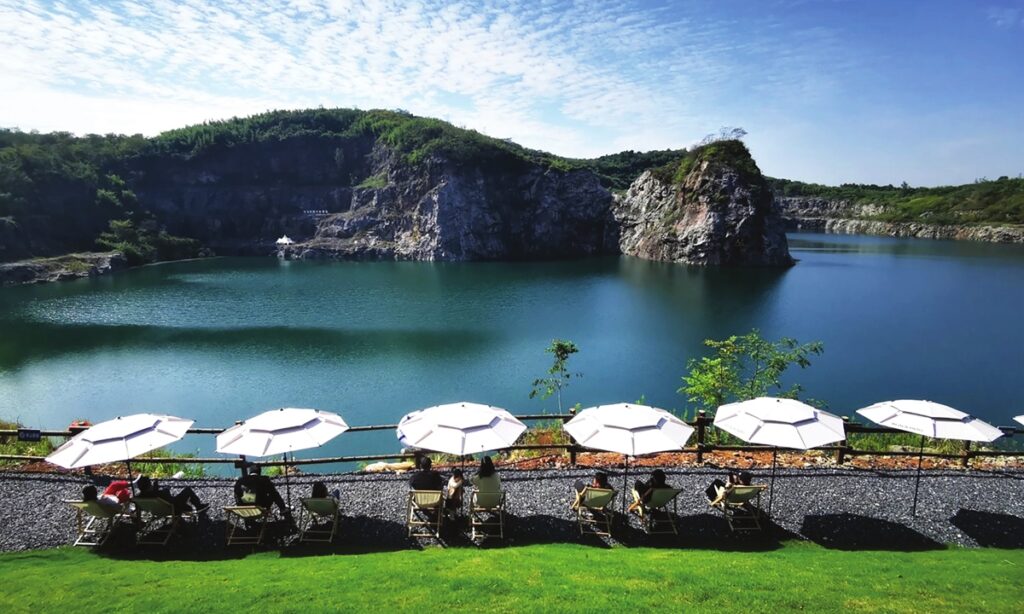A disused quarry pit in a valley surrounded by verdant mountains at the center of which is a small lake with water the color of gem blue due to mineral deposits, sounds like an unlikely coffee spot.
The 376-mu (61.9-acre) pit and a small house beside together, however, make up one of the world’s largest cafés. Visitors, with a cup of coffee in hands, sit relaxed around the pit, chat, and take photos while enjoying the beautiful scenery.
This is the coffee shop in the rural county of Anji, East China’s Zhejiang Province, and currently one of the hottest travel destinations in China. On Chinese social media platforms, users call the café one of the most worthwhile places to visit in eastern China because of its creative combination of coffee, the quarry pit and expansive natural beauty.
It’s hard to believe that this bustling tourist attraction was a mere abandoned pit and safety hazard just two years ago, And an even busier quarry, and noise and environment polluter before that.
A miracle
Located in Anji’s Hongmiao village, the Deep Blue Café is a vivid example of how local people transformed a former pollution site into an ecotourism destination, achieving rural revitalization through green development, observers commented.
Cheng Shuoqin, director of the café, recalled that in March 2021, the Anji government learned that a few backpackers liked to visit the then abandoned quarry pit. An inspection conducted by the local government revealed many safety hazards including wide cracks and partial collapses.
The local authority soon addressed the safety concerns, and considered turning the pit into a commercial project. “We submitted our café plan, and they [officials] accepted,” Cheng told the Global Times.
After months of preparation, Cheng and his team started the construction of the café in April 2022. They discovered an old half-buried house beside the pit – “[it was] a cement factory plant in the 1970s” – excavated, cleaned and lightly decorated the house, turning it into a café within only 18 days.
The whole pit also belongs to the café as a sort of backyard. Cheng introduced that they charge each visitor 68 yuan ($9.42), for a package including entrance fees to the pit area and a cup of coffee.
Unlike many other tourist attractions that make the most out of local resources to earn more money, Cheng said they haven’t explored any other profitable projects apart from selling coffee. “We want to keep it the way it was,” he told the Global Times. “We want our visitors to simply enjoy the adequately attractive natural beauty.”
Less is more
The café soon went viral online after it opened to public in May 2022. It has, so far, welcomed more than 400,000 visitors, serving 500 to 800 visitors per day on weekdays and 2,000 to 3,000 at weekends, according to Cheng.
The May Day holidays this year were a peak for the café. The influx of tourists brought the café 800,000 yuan of income within three days during the holiday, Cheng revealed. “There was one day we sold a record 5,120 cups of coffee,” he recalled. “Our 80 plus coffee machines were in constant operation from dawn to dusk.”
The highly profitable café has also directly benefited local villagers. Cheng said that the company that operates the café holds 51-percent stake in the café, and the remaining 49 percent belongs to Hongmiao village’s residents as well as the village collective.
“Our village collective economy is expected to increase by more than 150,000 yuan this year because of the café.”
Value of green development
During an inspection tour to Anji in August 2005, Xi Jinping, then Party chief of Zhejiang, spoke highly of the wise move by local people to shut down mines.
During the tour, Xi put forward the famous concept translated as “mountains and rivers green are mountains of silver and gold.”
In recent years, under the guidance of the “two mountains” concept, the once heavily-polluted county of Anji has made great strides in improving the environment and developing ecotourism. Now the county has turned itself into a renowned destination for green tourism, with the flourishing of its various supporting industries such as agritainment and country inns.
The café industry in the country has also boomed in the last two years. Apart from Deep Blue, there are more than 300 cafés in Anji, making it one of the Chinese counties with the highest number of cafés. Many of the cafés are located near paddy fields or in forests, attracting customers with their proximity to nature.
“The popularity of our café and many other similar tourist attractions has showed that developing ecotourism is the right way,” Cheng told the Global Times. “They have proven to be of great value to natural beauty.”
(Global Times)




